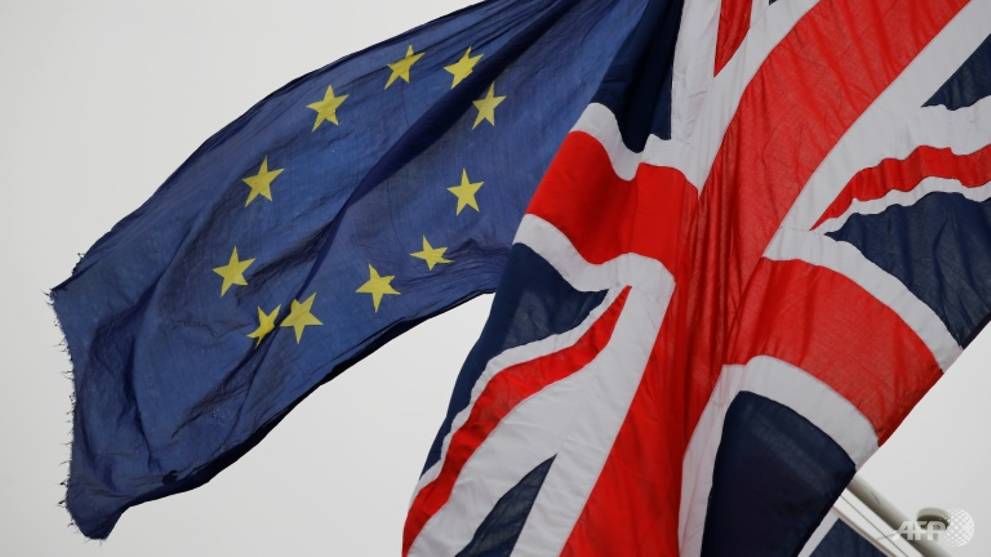
BRUSSELS: The European Union and Britain ordered their negotiators back to work on Sunday (Dec 13) after agreeing to abandon a supposed make-or-break deadline for a post-Brexit trade pact.
EU chief Ursula von der Leyen and Prime Minister Boris Johnson had said last week they would decide whether an agreement was possible by the end of Sunday, but agreed in a crisis call to "go the extra mile".
"Our negotiating teams have been working day and night over recent days," von der Leyen said in a video message, reading out a joint statement agreed with Johnson.
"We have accordingly mandated our negotiators to continue the talks and to see whether an agreement can even at this late stage be reached," the leaders said, without offering a new deadline.
EU negotiator Michel Barnier and Britain's David Frost held talks late on Saturday and early on Sunday. They have been alternating between the capitals but a European official said that, for the moment, they would remain in Brussels.
READ: No deal on Brexit trade more likely than agreement: EU Commission chief
READ: UK PM Johnson says no-trade deal Brexit is 'very, very likely'
Speaking for himself, Johnson insisted that agreement was far from sure with less than three weeks to go until Britain leaves the EU single market at the end of the month.
"I'm afraid we're still very far apart on some key things, but where there's life there's hope," he said at Downing Street after briefing his cabinet about the call.
"The UK certainly won't be walking away from the talks. I still think there's a deal to be done if our partners want to do it," he added.
Johnson said Britain "would be as creative as we possibly can", confirming that he had sought anew to engage directly with Paris or Berlin but was rebuffed by the EU.
Reports suggested the two sides were exploring a potential deal on how to respond if their regulations diverge over time and threaten fair competition.
But Britain cannot compromise on the "fundamental nature" of Brexit, controlling UK laws and fisheries, the prime minister said.
Without a deal, cross-Channel trade will revert to World Trade Organization rules, with tariffs driving up prices and generating paperwork for importers, and the failed negotiation could poison relations between London and the continent for years to come.
READ: Nerves in Britain's financial sector at prospect of a 'no-deal' Brexit
"Either way, whatever happens, the UK will do very, very well," Johnson insisted.
NO STONE UNTURNED'
Ireland stands to lose out more than any other EU country if trade with its larger neighbour is disrupted, and cautiously welcomed the reprieve.
"Time to hold our nerve and allow the negotiators to inch progress forward, even at this late stage. Joint statement on Brexit negotiations is a good signal. A deal clearly very difficult, but possible," Foreign Minister Simon Coveney tweeted.
The hardline pro-Brexit faction in Johnson's own British Conservatives was unconvinced, however, and MPs fired their own tweets warning against any concessions.
Much of the text of a possible trade deal is said to be ready, but Britain and Brussels are wrangling over a mechanism to allow for retaliation if UK and EU laws diverge in a way that puts continental firms at a competitive disadvantage.
"The defence of the single market is a red line for the European Union," an EU source said. "What we have proposed to the United Kingdom respects British sovereignty. It could be the basis for an agreement."
READ: Shortages, jams and shutdowns: UK readies for Brexit 'no-deal' chaos
READ: Johnson tells UK to 'get ready' for no-deal Brexit collapse
On Saturday, Downing Street had said the government had a playbook that "maps out every single foreseeable scenario" for potential problems after Dec 31, and "no one needs to worry about our food, medicine or vital supply chains".
UNRESOLVED ISSUES
With less than three weeks until the UK’s final split from the EU, key aspects of the future relationship between the 27-nation bloc and its former member remain unresolved.
Progress came after months of tense and often testy negotiations that gradually whittled differences down to three key issues: fair-competition rules, mechanisms for resolving future disputes and fishing rights.
It has been four and a half years since Britons voted by 52-48 per cent to leave the EU and - in the words of the Brexiteers’ slogan - "take back control" of the UK’s borders and laws.
It took more than three years of wrangling before Britain left the bloc’s political structures on Jan 31. Disentangling economies that have become closely entwined as part of the EU’s single market for goods and services took even longer.
The UK has remained part of the single market and customs union during an 11-month post-Brexit transition period. That means so far, many people will have noticed little impact from Brexit.
BIG CHANGES FROM JAN 1
On Jan 1, it will feel real. New Year's Day will bring huge changes, even with a deal. No longer will goods and people be able to move between the UK and its continental neighbours.
Exporters and importers face customs declarations, goods checks and other obstacles. EU nationals will no longer be able to live and work in Britain without a visa - though that doesn't apply to the more than three million already there - and Britons can no longer automatically work or retire in the EU.
https://news.google.com/__i/rss/rd/articles/CBMiamh0dHBzOi8vd3d3LmNoYW5uZWxuZXdzYXNpYS5jb20vbmV3cy93b3JsZC9icmV4aXQtdWstZXUtbm8tZGVhbC10cmFkZS10YWxrcy1qb2huc29uLXZvbi1kZXItbGV5ZW4tMTM3NjE5OTbSAQA?oc=5
2020-12-13 16:30:00Z
52781222921133
Tidak ada komentar:
Posting Komentar